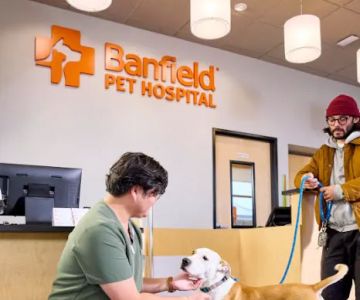Can You Shadow a Veterinarian? A Step-by-Step Guide to Gaining Hands-On Experience
- Why Shadowing a Veterinarian Is Beneficial
- How to Arrange Shadowing a Veterinarian
- Tips for Shadowing a Veterinarian
- What to Expect When Shadowing a Veterinarian
- Real-Life Experience: Shadowing a Veterinarian
For many aspiring veterinarians, one of the most valuable experiences in their journey is shadowing a professional in the field. But the question remains—can you shadow a veterinarian? The answer is yes, and in fact, shadowing is an essential way to gain hands-on insight into the daily responsibilities of a veterinarian. In this article, we will explore why shadowing a veterinarian is important, how to arrange it, and what you can expect from the experience. Whether you're considering a career in veterinary medicine or simply want to learn more about the profession, shadowing provides a unique opportunity to observe, learn, and grow.
1. Why Shadowing a Veterinarian Is Beneficial
Shadowing a veterinarian allows you to gain real-world experience that you cannot find in textbooks or classrooms. It’s a chance to see how theoretical knowledge is applied in actual clinical settings, where no two days are the same. For anyone interested in becoming a veterinarian, shadowing provides firsthand exposure to the challenges and rewards of veterinary practice.
Some of the key benefits of shadowing a veterinarian include:
- Real-World Insight: Shadowing gives you a glimpse into the daily responsibilities of a veterinarian. From diagnosing diseases to performing surgeries and interacting with clients, you’ll understand what the job entails.
- Hands-On Learning: While you may not be able to perform medical procedures, shadowing gives you the chance to observe treatments, diagnostic tests, and consultations, which deepens your understanding of the profession.
- Building Connections: Shadowing a veterinarian also helps you build valuable relationships with professionals in the field, which could lead to future opportunities like internships or employment.
- Clarifying Career Goals: Shadowing provides the clarity needed to determine whether veterinary medicine is truly the right career path for you, helping you make an informed decision about your future.
2. How to Arrange Shadowing a Veterinarian
Arranging a shadowing opportunity can be an exciting step toward pursuing a career in veterinary medicine. Here’s how you can go about securing a shadowing experience:
- Contact Veterinary Clinics: Start by reaching out to local veterinary clinics, animal hospitals, and specialty practices. Many veterinarians are open to having high school or college students shadow them to gain experience.
- Networking: If you know anyone in the veterinary field, such as a family friend, teacher, or mentor, ask if they can help you arrange a shadowing opportunity. Networking can be a powerful tool to find the right connections.
- Volunteer: Some veterinary practices offer volunteer programs where you can gain experience while assisting with basic tasks. Volunteering is a great way to get your foot in the door and establish rapport with the practice.
- Be Professional: When you reach out to veterinarians, ensure you present yourself professionally. Write a polite email or letter expressing your interest in shadowing and why you want to learn more about the field. Include details about your availability and willingness to assist in any way.
3. Tips for Shadowing a Veterinarian
Shadowing a veterinarian can be a rewarding experience, but it’s important to make the most of it. Here are some helpful tips for shadowing:
- Be Observant: Your primary role during shadowing is to observe and learn. Take detailed notes, ask thoughtful questions, and pay attention to the veterinarian’s interactions with clients and staff. Every situation is an opportunity to learn.
- Be Respectful: Veterinarians are busy professionals, so be mindful of their time. Be punctual, polite, and respectful of the practice’s policies and procedures. Avoid interrupting or making unnecessary noise during procedures.
- Stay Engaged: Ask questions when appropriate, but also know when to remain silent and observe. Veterinarians may be focused on specific tasks, so ensure that your questions are relevant and not disruptive.
- Dress Appropriately: While you’re not expected to wear a full veterinary uniform, make sure you dress in a clean, professional manner. Avoid wearing jewelry or clothing that could get in the way during animal interactions.
4. What to Expect When Shadowing a Veterinarian
When you shadow a veterinarian, there’s a lot to absorb in a short amount of time. Expect a variety of tasks and responsibilities, and be ready for a fast-paced environment. Here’s a general overview of what you might experience:
- Patient Interaction: You’ll likely observe veterinarians interacting with pet owners, diagnosing animals, and explaining treatment options. Watching how veterinarians communicate with pet owners is a valuable skill to learn.
- Medical Procedures: While you may not be able to perform procedures yourself, you can observe surgeries, X-rays, ultrasounds, and other diagnostic techniques. This is an invaluable learning experience for aspiring veterinarians.
- Handling Emergencies: Depending on the practice, you may witness emergency cases. These fast-paced situations offer a glimpse into the critical thinking and quick decision-making required in veterinary care.
- Teamwork: Veterinary practices rely heavily on teamwork. You’ll see how veterinarians work closely with veterinary technicians, nurses, and receptionists to ensure smooth operations and provide the best care for animals.
5. Real-Life Experience: Shadowing a Veterinarian
Let’s take a look at a real-life story of someone who shadowed a veterinarian. Sarah, a college student interested in becoming a veterinarian, spent a week shadowing Dr. Linda, a general practitioner at a busy animal hospital. Sarah was initially unsure if she wanted to pursue small animal care or another specialty, but after a few days of shadowing, she was able to witness how fulfilling it is to care for pets and develop relationships with their owners. One day, she was able to observe Dr. Linda perform surgery on a dog with a broken leg, and the experience solidified her decision to pursue a career in small animal practice.
Sarah’s experience is a perfect example of how shadowing can help clarify career goals and provide a deeper understanding of veterinary medicine. By observing Dr. Linda’s compassionate care and skillful procedures, Sarah gained insights that will guide her future career path.
6. Book a Consultation for Your Veterinary Shadowing Experience
If you’re eager to start your own journey toward becoming a veterinarian, consider reaching out to local veterinary practices to arrange a shadowing experience. Shadowing is one of the best ways to learn about the profession and decide if it’s the right fit for you. Additionally, if you’re looking for professional advice or guidance on veterinary career paths, consider booking a consultation with experienced veterinarians who can offer valuable insights and tips.
Start your veterinary career journey today—whether you're shadowing or learning more about the field, there are countless ways to get involved and make a difference in the lives of animals.











